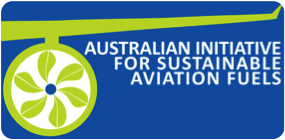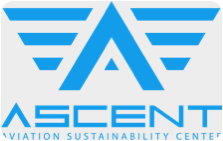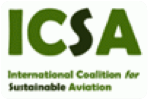
 Category: Research
Category: ResearchGeographic focus: Global
The mission of the Carbon War Room’s Renewable Jet Fuels Initiative is to reduce the aviation industry's greenhouse gas emissions by accelerating the scale-up of a sustainable renewable jet fuel industry. It is a small/medium industry-focussed non-profit organisation founded in the late 2000’s. It is focused solely on the jet fuel element of the sustainable aviation agenda. To date it has published excellent research on the sustainability credentials of potential suppliers.
Challenges: Independence - Being founded and originally backed by Richard Branson (Virgin Group) at times creates a commercial perception barrier that prevents deep engagement from competing airlines. It is understood that Branson provided the original the start-up funding yet now the organisation must be self-funding. It is thought that the Carbon War Room has an annual budget of around US$2 million.
Stregths: The organisations renewable jet fuels stream leader Suzanne Hunt has a track record of producing high quality research on biofuels and is well networked with airlines around the world. Its association with Branson provides it brand credibility.
Update: It is understood that Suzanne Hunt has recently departed the Carbon War Room (merged with Rocky Mountain Institute) for a new opportunity and rumour has it the Renewable Jet Fuels Initiative she headed is winding down.
 Category: Research (Technology prototyping, Government funded)
Category: Research (Technology prototyping, Government funded)Geographic focus: Europe
Clean Sky is Europe’s most ambitious aeronautical research programme. Its mission is to develop breakthrough technologies that significantly increase the environmental performances of air transport, resulting in less noise and more fuel-efficient aircraft, in turn contributing a key step towards achieving the Single European Sky environmental objectives. The Clean Sky JTI (Joint Technology Initiative) was born in 2008 and represents a unique Public-Private Partnership between the European Commission and the industry. It is managed by the Clean Sky Joint Undertaking (CSJU) until 31 December 2017. The CSJU aims to deliver demonstrators in all segments of civil air transport, grouped into six technological areas called 'Integrated Technology Demonstrators' (ITD).
Clean Sky JTI was born in 2008 with a budget of €1.6 billion (to last until 31 Dec 2017), contributed to on a 50/50 basis by the European Commission (in cash) and the aeronautical industry (in-kind contribution). ITD Leaders commit up to 50%, Associates members up to 25% and Partners (through Call for Proposals) a minimum of 25%.
Challenges: Regional orientation - Being solely European focussed makes research outcomes inaccessible to other countries and industry participants which can hold back global market transformation.
Strengths: Budget - A significant budget of €1.6 billion over 10 years focussed on technology demonstration
 Category: Research (Multiple types, Government funded)
Category: Research (Multiple types, Government funded)Regional focus: North America
The FAA Centre of Excellence (ASCENT) is focussed on meeting the environment and energy goals of the Next Generation Air Transportation System, including reducing noise, improving air quality, reducing climate impacts, and improving energy efficiency. It explores ways to produce sustainable aviation fuels at commercial scale, creating an industry with the potential for large-scale economic development and job creation. It discovers science-based solutions that will benefit the aviation industry and improve the health and quality of life of those living and working around airports. ASCENT is partnered with numerous U.S. universities and U.S. aviation industry organisations. MIT and WSU universities are the leaders of this Centre of Excellence. WSU and MIT will split US$4million a year for 10 years from the FAA’s US$40million for this Centre of Excellence.
ASCENT reinvigorates and replaces the efforts of PARTNER (Partnership for AiR Transportation Noise and Emissions Reduction) initiative. PARTNER was a leading aviation cooperative research organization. PARTNER was a former FAA Center of Excellence sponsored by the FAA, NASA, Transport Canada, the U.S. Department of Defence, and the U.S. Environmental Protection Agency.
Challenges: As it US industry focussed many of the outcomes which can hold back global market transformation.
Strengths: Stable funding and coordination – Backed by government rather than individual companies the research outcomes should theoretically become transparently available to all U.S. industry participants
 Category: Research (Technical papers, Government funded)
Category: Research (Technical papers, Government funded)Geographic focus: North America
The Laboratory for Aviation and the Environment is a unit of the Department of Aeronautics and Astronautics at the Massachusetts Institute of Technology. The mission of the lab is to advance the understanding of the environmental impacts of aviation, and to develop approaches to mitigate those impacts. It is backed by the Federal Aviation Administration (FAA) by its multimillion dollar ASCENT program.
Challenges: Engagement – Due to its reasonably small size it produces very high quality technical research but at a low volume (currently approximately one research project per month) focussed on aviation research niches.
Strengths: It produces excellent research and is funded largely by the U.S. FAA
 Category: Research (Aviation technology prototyping, Government funded)
Category: Research (Aviation technology prototyping, Government funded)Geographic focus: North America
In realigning its research to reflect a new strategy for aeronautics focused on tackling the global challenges civil aviation could face in the next 20-40 years, NASA has introduced a new initiative with its fiscal 2015 congressional budget request. The Transformative Aeronautics Concepts Program (TACP) is structured to provide incentives for multi-disciplinary, leap-ahead research that is designed to bring technologies from other sectors into aviation and rapidly demonstrate the feasibility of new ideas. NASA saught US$79.5 million (~$20m p.a. budget) for the new TACP in 2015. In addition to funding feasibility demonstrations under the Convergent Aeronautics Solutions project, the program aims to continue NASA’s work on developing breakthrough design and analysis tools.
Although mainly aimed at supporting proposals from internal NASA researchers, the TACP includes a small amount of seed funding—$5 million in fiscal 2015, increasing to around $10 million—to support feasibility demonstrations of external ideas. The agency’s contracting specialists must be brought on board for the initiative to succeed.
Challenges: Focus, Transparency – Targeted to benefit US industry and not overtly focussed on sustainable aviation
Strengths: Expertise / Funding – Draws on NASA’s massive body of knowledge and that of its contractors. The funding is substantial enough to conduct some good large scale prototyping and experimentation. Its government funding should theoretically lead to the research findings being transparently made available to all U.S. industry players
 Category: Research (Technical papers, Government funded)
Category: Research (Technical papers, Government funded)Geographic focus: Global
The University of Cambridge Institute for Aviation and the Environment (IAE) incorporates scientific research, technological developments and economic thinking to address the needs of the aviation and aerospace industries regarding the environment. The improvements in technology and operation, needed to allow sustainable development of air transport, depend crucially on the delivery to manufacturers, airlines and regulators of robust results incorporating improved understanding of the processes and interactions that determine the environmental impact. The Institute fosters a close alliance between academia, industry and government to facilitate the transfer of knowledge by aligning world-leading research with end-user needs.
Challenges: Given the website is largely obsolete with few updates since 2008 it appears that this institute may have run out of puff
Strengths: University of Cambridge brand and links to world experts in the field of sustainable aviation
 Category: Policy Research (think tank)
Category: Policy Research (think tank)Geographic focus: United Kingdom
Sustainable Aviation UK describes itself as a “long-term strategy” that sets out the collective approach of UK aviation to tackling the challenge of ensuring a sustainable future for our industry. A world-first, Sustainable Aviation was launched in 2005 and brings together the main players from UK airlines, airports, manufacturers and air navigation service providers. Sustainable Aviation has produced four Progress Reports to date, the latest published in January 2014, following reports in 2011, 2009 and 2006. Sustainable Aviation aims to continue to deliver on the goals and commitments identified in the strategy, monitoring and tracking the practical cooperative work being undertaken by signatories as well as promoting it’s efforts both within the UK and internationally.
Challenges: Regional Orientation / Funding / Scale – The organisation is focussed solely on sustainable aviation in the UK. It is set up as a non-profit and receives funding solely from its signatories.
Strengths: Leadership, Industry Connections – The organisation is chaired by Jonathon Counsell (Head of Environment at British Airways) and is supported by aviation industry signatories that include most key players in UK aviation. Despite its initial appearence as a vested interests (due to funding source being primarily the air transport industry and board leadership coming from industry) it shows real leadership and drives positive collaboration in the field of sustainable aviation.
 Category: Policy research and lobby group (for airline industry)
Category: Policy research and lobby group (for airline industry)Geographic focus: North America and Europe
ATAG represents a coalition of member organisations and companies throughout the global air transport industry. It is based in Geneva, Switzerland, and is the only global association that represents all sectors of the air transport industry. Its stated mission is to promote aviation’s sustainable growth for the benefit of global society. It works to define common positions on issues and to make expert and constructive contributions to the industry and governmental consultation process.
The organisation:
In so doing, ATAG plays an influential role in ensuring that aviation can continue to grow according to market demands and deliver the enormous economic and social benefits it brings to the world.
Challenges: Reputation/Independence and Regional Orientation - Being funded and driven by the aviation industry and with a communication style that some have said occasionally borders on 'green wash', these matters have at times created an integrity perception issue that undermines the groups otherwise high calibre work in the field of sustainable aviation. ATAG also developed the websites http://aviationbenefits.org/ and www.enviro.aero. Since the group is funded and governed by industry it will always be beholden to industry pressures first and foremost. ATAG has been seen to be primarily U.S. and European focussed.
Strengths: Industry Engagement, Governance and Funding – Being industry driven has its advantages for instance as a result ATAG has excellent industry engagement, good governance and stable funding. The ATAG Enviro.Aero Aviation Industry Commitment to Action On Climate Change Pledge of April 2007, signed by many of the airline industry’s key players was a historic and exemplary leadership effort.
 Category: Lobby group (On behalf of environmental NGO’s)
Category: Lobby group (On behalf of environmental NGO’s)Regional focus: Global
The International Coalition for Sustainable Aviation (ICSA), established in 1998, is a structured network of environmental non-governmental organisations (NGOs) who share a common concern with civil aviation’s contribution to air quality issues, climate change and noise, and who are committed to developing and providing technical expertise, common policy positions and strategies with a view to reducing emissions and noise from the aviation sector.
In pursuit of this objective, ICSA’s role is to provide environmental NGOs world-wide with observer status in the UN’s International Civil Aviation Organization's Committee for Aviation Environmental Protection (CAEP) and subsidiary bodies. Since its inception, ICSA has contributed to CAEP’s work on technical means to reduce emissions and noise, the role of market-based measures, supporting economic and environmental analysis, modelling and forecasting, and ICAO’s carbon calculator. It has also been invited to present its views at ICAO workshops on carbon markets and bio-fuels, and has presented to the high-level Group on International Aviation and Climate Change (ICAO GIACC) of 2008/2009. ICSA uses the expertise within its NGO membership to formulate its co-ordinated positions. To gain the broadest level of understanding and input from environmental NGOs, ICSA communicates with, and invites comment from, other NGO networks and bodies working in related areas. ICSA’s participation in ICAO and CAEP meetings is currently provided by the Aviation Environment Federation (AEF), the International Council for Clean Transportation (ICCT) and Transport and Environment (T&E).
Challenges: Funding – To maintain its independence and reputation for altruistic integrity it only accepts funding and support from other environmental NGO’s which can naturally limit its growth potential.
Strengths: Environmental NGO based gives it a good reputation for altruistic integrity. It is considered a subject matter expert advisor- It provides a low-volume of advisory documents but those produced are high quality. It has a reputation for collaborating with other NGO organisations. It holds consultative status with ICAO.
 Category: Research / Lobby Group (environmental NGO)
Category: Research / Lobby Group (environmental NGO)Geographic focus: United Kingdom
The Aviation Environment Federation (AEF) is the principal UK non-profit environmental association concerned with the environmental effects of aviation. This membership based organisation promotes a sustainable future for aviation which fully recognises, and takes account of, all its environmental and amenity effects, ranging from aircraft noise issues associated with small airstrips or helipads through to the contribution of airline emissions to climate change. The AEF was established in 1975 because of growing concerns regarding noise from private aircraft. This remains an important part of AEF’s work, but in recent years increasing attention has been focussed on the impacts of commercial aviation. The AEF has over 120 affiliated members comprising community and environmental groups, local authorities, parish councils, businesses and consultancies and individuals. The group offers advice and information in response to enquiries and requests for help from members concerning local issues such as noise mitigation, the planning and development control process and aerodrome case histories. The AEF uses members’ experiences and its own research to highlight gaps in policy or legislation, to inform its campaigns, and to develop positions on policy development and consultations. The AEF’s core work is funded by membership subscriptions, donations, and by grants from trusts and charities working in the field of environmental protection. Occasionally the group undertakes selected consultancy tasks.
Challenges: Size / Regional Orientation – This is a small group focussed on aviation's environmental impact in the UK.
Strengths: Integrity – A non-profit membership based association governed by a constitution driven by a charitable purpose guarantees its integrity
 Category: Lobby group (Grassroots deep green environmental NGO)
Category: Lobby group (Grassroots deep green environmental NGO)Geographic focus: United Kingdom
Plane Stupid is a network of grassroots groups that take non-violent direct action against aviation/airport expansion. The organisation wants three things: an end to short-haul flights and airport expansion; a stop to aviation advertising and a just transition to sustainable jobs and transport.
It was founded in 2005 to oppose a specific aviation industry conference and has operated ever since. So far Plane Stupid have occupied Stansted, East Midlands, and Aberdeen airports; shut down easyJet and BAA’s headquarters; stopped private jets at Biggin Hill, London City and Edinburgh airports; sat atop the House of Commons and the Scottish Parliament; supported the Camp for Climate Action at Heathrow; worked with local residents to defend their homes from compulsory acquisitions; exposed a corporate spy and attacked British Politician Peter Mandelson with green custard. They organise horizontally, by consensus and without leaders. They have groups in London, Glasgow, Brighton, Manchester, Southampton, Leeds, Edinburgh and Cambridge.
Challenges: Reputation/Regional Orientation/Leadership - Although wanting a transition to sustainable aviation they are a deep green ‘tip of spear’ sustainability activist organisation that cannot work collaboratively with industry. Without a publically designated leader it is largely impossible to undertake negotiations. They are regionally focussed on the UK.
Strength: Awareness - Their astonishing actions generate news stories that drive community interest, education and awareness in the field of sustainable aviation.
Other environmental orientated NGO’s that have shown concern and relevance to sustainable aviation include:
 Category: Sustainable Aviation News Media
Category: Sustainable Aviation News MediaRegional focus: Global
Launched in November 2007, GreenAirOnline is a web-based publication dedicated to producing independent, informative and up-to-the-minute news, features and statistics on current issues surrounding aviation and its impact on global warming and the environment. It has no association with industry, environmental pressure groups or government bodies and so is able to present opinions from all sides of this debate without fear or favour. They take an objective journalistic approach where news and views can be given a single platform.
Challenges: Scale and Focus - Being a small UK-based media business with one employed journalist, GreenAirOnline produces high-quality but low-volume sustainable aviation news content (on average one update per week) free to the public.
Strengths: Independence and quality – GreenAirOnline is headed by Christopher Surgenor a respected journalist with 35 years experience and no apparent vested interests. The airline industry considers GreenAir online to be a highly respected and trusted source for eco-aviation news.
 Category: Sustainable Aviation News Media
Category: Sustainable Aviation News MediaGeographic focus: Global
For nearly 50 years, Air Transport World (ATW) has been the leading monthly magazine serving the needs of the global airline and commercial air transport manufacturing communities. Through its respected editors—who have been nominated for nearly every major aviation journalism award available today—ATW provides balanced international coverage of the airline industry and reports on the trends that affect the way airlines do business. Eco-aviation is one of several theme based news sections covered by this publication.
Challenges: Focus – With eco-aviation being just a small editorial division of a large media business it typically only provides recent mainstream news snippets on industry related sustainable aviation ‘copy/paste press release’ news not investigative long-form content. Additionally this is mainly only available to paying customers.
Strengths: Quality - This publication has a long history as a respected high quality source for air transport industry orientated news
 Category: Sustainably Aviation Fuel News Media
Category: Sustainably Aviation Fuel News MediaRegional focus: Global
Each weekday, 34,000 subscribers receive the Biofuels Digest newsletter, covering producer news, research, policy, policymakers, conferences, fleets and financial news. Another 15,000 additional readers subscribe instead to one of the organisations other publications, BioBased Digest or BioInvest Digest.
Biofuels Digest is the most widely-read biofuels daily in the world (sources: Alexa, Quantcast). According to Biofuels Digest, 62 percent of subscribers call it “the best online biofuels media”.
The Digest is home to:
The organisation also organises the annual The Advanced Biofuels Leadership Conference (ABLC) and the Advanced Biofuels Markets Conference (ABMC).
Editorial note: In Australia the Biofuels Digest is somewhat similar to the well regarded Australian Carbon+Environment Daily
Challenges: Small number of article contributors
Strengths: Solid expertise and experience mainly thanks to chief editor and publisher Jim Lane
 Category: Sustainable Aviation Verification Scheme
Category: Sustainable Aviation Verification SchemeGeographic focus: Global
The World Green Aviation Council (WorldGAC) describes itself as an international organization dedicated to advancing a greener and more sustainable aviation industry through fuel efficiency, water conservation, and noise and greenhouse gas reduction. Small and only a few years old, WorldGAC reviews, certifies and verifies airlines and operators to best determine compliance to Fly-360-Green certification standards. Fly-360-Green aims to be a world standard certifier for sustainable aviation. Its mission is to foster the international standard for sustainable aviation and facilitate the global transformation of the aviation industry by addressing aviation's absolute emissions.
Challenges: Focus, Quality, Experience, Independence – Focussed predominantly around an emerging certification program, WorldGAC also has lower quality website in need of upgrade and it is unclear which organisations or individuals are behind it.
Strength: Focus and Independence – Despite also being key weaknesses, WorldGAC’s apparent independence and focus on a certification program could also make it unique and provide strength as it grows in the future.

Regional focus: North America
Since 2006 the Commercial Aviation Alternative Fuels Initiative (CAAFI) has sought to enhance energy security and environmental sustainability for aviation by exploring the use of alternative jet fuels. CAAFI is a coalition of around 300 industry stakeholders including airlines, aircraft and engine manufacturers, energy producers, researchers, international participants and U.S. government agencies. Together these stakeholders are leading the development and deployment of alternative jet fuels for commercial aviation. CAAFI’s goal is to promote the development of alternative jet fuel options that offer equivalent levels of safety and compare favourably on cost with petroleum based jet fuel, while also offering environmental improvement and security of energy supply for aviation. CAAFI is co-sponsored by the Aerospace Industries Association (AIA), Airports Council International - North America (ACI-NA). CAAFI facilitates the exchange of information about and coordination of private-sector and governmental initiatives supporting the development and commercialization of "drop-in" alternative aviation fuels (i.e., fuels that can directly supplement or replace petroleum-derived jet fuels). CAAFI is also exploring the long-term potential of other fuel options. Some CAAFI Members have access to the Microsoft Sharepoint-based FAA Knowledge Sharing Network (KSN).
Challenges: Regional Orientation (U.S. focussed), Fuel solution focus, Transparency, Limited use of online communication technology
Strengths: Industry support and Aviation experience, especially Richard Altman
 Category – Pledge / Lobby Group
Category – Pledge / Lobby GroupRegional focus: Global
The Sustainable Aviation Fuel Users Group was formed in September 2008 by Boeing with support and advice from the world's leading environmental organizations such as the Natural Resources Defence Council and the Roundtable on Sustainable Biomaterials (RSB). The group is focused on accelerating the development and commercialization of sustainable aviation biofuels.
All SAFUG member airlines, covering around 32% of world commercial aviation fuel demand have signed a never-ending SAFUG Sustainability Pledge, and believe that a key driver to a carbon neutral industry is advancing and adopting sustainable aviation fuels. Boeing Commercial Airplanes established this group following recognition that the aviation biofuels industry was at risk of collapsing before it even really began unless industry discarded unsustainable first generation biofuels from its options list after realising that due to their social impacts they are not an acceptable long term energy option. If first generation biofuels were unwittingly adopted by airlines then the public would revolt. The SAFUG pledge has been effective in educating and warning airlines of first generation biofuels. It is in all airlines best interests to become members and signatories of SAFUG. This pledge complements the ATAG Enviro.Aero Aviation Industry Commitment to Action On Climate Change Pledge of April 2007, signed by many of the airline industry’s key players.
Challenges: Transparency – The organisation should identify itself more readily that it is associated with Boeing and accordingly explain its structure and individuals involved more clearly. Despite being a noble win-win initiative it has been said that its lack of transparency creates a public perception of hidden motives.
Strengths: Industry backed / Effective thus far
 Category: Leading sustainable aviation fuels certification system
Category: Leading sustainable aviation fuels certification systemRegional focus: Global
The Roundtable on Sustainable Biomaterials (RSB) is an international initiative that brings together farmers, companies, non-governmental organizations, experts, governments, and inter-governmental agencies concerned with ensuring the sustainability of biomaterials production and processing. Originally established in 2007 to ensure the sustainability of liquid biofuels for transport (then named as the Roundtable on Sustainable Biofuels), the RSB expanded its scope in 2013 to cover biomaterials and as such evolved its name. RSB’s Vision is the global sustainable production, conversion, and use of biomass.
RSB’s Mission is to:
Every fuel type that the RSB certifies has a period where it is open for public comment.
Challenge: Politics – At times, and despite its best intentions, it would appear that the RSB has traded-off some 'perfect' environmental sustainability value for political expediency.
Strength: Collaborative – RSB involves all key players in the aviation biofuels supply chain
See also Bonsucro in regards to sustainable sugar cane.
 Category: Social venture (profit for purpose) / Sustainable Aviation Fuel Supplier
Category: Social venture (profit for purpose) / Sustainable Aviation Fuel SupplierRegional focus: Global
It is SkyNRG’s mission to play a pioneering role in creating a long-term sustainable future for aviation. SkyNRG is a global market maker for sustainable jet fuel, supplying more than 20 carriers across 5 continents mainly for low volume groundbreaking trial flights thus far. The organisation has adopted a unique approach as a project manager consultant working to bring together the pieces of the supply chain puzzle to get ‘fuel in wing’ rather than investing in major fuel assets or developing particular fuel technology IP. Technology agnostic, SkyNRG mainly produces its fuel via the HEFA pathway principally using vegetable oils and waste oils and greases as the feedstock. They seek to lead in sustainability and be easy to do business with whilst they work to produce affordable fuel at steadily greater volumes. SkyNRG is closely aligned with KLM airlines, Spring Associates and North Sea Group.
Challenges: Funds – SkyNRG needs to eventually move up the supply chain by purchasing assets and IP to become more effective and ensure it has a long term position as both a market maker and market leader
Strength: Nimble, creative approach – SkyNRG changed the game and made the impossible possible due to its small size and creative approach to overcoming the issue of SAF production
 Category: Global peak regulatory body for air transport
Category: Global peak regulatory body for air transportRegional focus: Global
International Civil Aviation Organisation (ICAO) is a specialized agency of the United Nations. It codifies the principles and techniques of international air navigation and fosters the planning and development of international air transport to ensure safe and orderly growth. Its headquarters are located in Montreal, Quebec.
The ICAO Council adopts standards and recommended practices concerning air navigation, its infrastructure, flight inspection, prevention of unlawful interference, and facilitation of border-crossing procedures for international civil aviation. ICAO defines the protocols for air accident investigation followed by transport safety authorities in countries signatory to the Convention on International Civil Aviation (Chicago Convention). ICAO should not be confused with the similarly named, IATA, which is the peak industry-side body for air transport. Emissions from international aviation are specifically excluded from the targets agreed under the Kyoto Protocol. Instead, the Protocol invites developed countries to pursue the limitation or reduction of emissions through the International Civil Aviation Organization. ICAO's environmental committee continues to consider the potential for using market-based measures such as trading and charging, but this work is unlikely to lead to global action. It is currently developing guidance for states who wish to include aviation in an emissions trading scheme (ETS) to meet their Kyoto commitments, and for airlines who wish to participate voluntarily in a trading scheme.
Emissions from domestic aviation are included within the Kyoto targets agreed by countries. This has led to some national policies such as fuel and emission taxes for domestic air travel in the Netherlands and Norway, respectively. Although some countries tax the fuel used by domestic aviation, there is no duty on kerosene used on international flights.
ICAO is currently opposed to the inclusion of aviation in the European Union Emission Trading Scheme (EU ETS) largely due to how it interacts with global treaties and the interpretation precedent it could set for other regions to enact their own unilateral extraterritorially-overreaching taxes.
Challenges: Politics, Beaureacracy – It is beholden to the wishes of voting sovereign nations and a highly beurocratic hierarchy
Strength: Top global standards and regulatory body for air transport
 Category: Global Peak Body / Lobby Group (Industry)
Category: Global Peak Body / Lobby Group (Industry)Regional focus: Global
IATA is the largest and most effective aviation industry association. It represents 240 airlines, comprising 84% of global air traffic. IATA supports airline activity and helps formulate industry policy and standards. It has a reputation for being very effective at setting the global policy agenda for aviation. For instance, the decision to develop a global Market Based Measure (MBM) policy for international aviation at the 38th ICAO Assembly was driven by the work of IATA. The long-term sustainability activities of the association are governed through the IATA ENCOM Environmental Committee. The Board of Governors for IATA consists of elected airline CEO’s. The IATA ENCOM typically consists of the Heads of Environment or Government Affairs of leading airlines. ENCOM is one of the six IATA industry committees that reports to the Board of Governors. IATA largely understands the grand challenges facing the industry and is working reasonably effectively, albeit slowly, largely due to decision making bureaucracy, to address these issues. The group set aspirational global emissions reductions targets for its airline industry members several years ago under the environmentally progressive leadership of Giovanni Bisignanni who at one stage even flagged a future ‘destination zero’ emissions target for 2050.
Challenges: Reputation – In the field of sustainable aviation IATA’s reputation is often questioned as it is an industry lobby group first and foremost. It often strongly lobbies regulators regarding how to act and what laws should be put in place.
Strength: Industry backed, Large magnitude – IATA is backed and funded by the vast majority of the aviation industry
Other global aviation industry peak bodies (lobby groups) of relevance to sustainable aviation but of lesser significance include:
 Category: Research (Aviation bioenergy policy)
Category: Research (Aviation bioenergy policy)Regional focus: Global
The International Energy Agency (IEA) Bioenergy Task 40 aims to support the development of a sustainable, international, bioenergy market, recognising the diversity in resources and biomass applications. The organisation conducts studies and organizes events on various topics related to sustainable international bioenergy trade. It is born from the International Energy Agency (IEA), an international organization which is an autonomous unit within the OECD that "acts as energy policy advisor body to 28 member countries in their effort to ensure reliable, affordable and clean energy for their citizens." IEA Bioenergy is one of various "Implementing Agreements" that define the tasks of the IEA. IEA Bioenergy was established in 1978 by the International Energy Agency "with the aim of improving cooperation and information exchange between countries that have national programmes in bioenergy research, development and deployment." IEA Bioenergy has 11 tasks, of which one is Task 40: Sustainable International Bioenergy Trade: Securing Supply and Demand. Key supporters: Belgium, Canada, Finland, Germany, The Netherlands, Norway, Sweden, United Kingdom. Contributors to this group are lead academics from university around the world.
Challenges: Speed / Communications – This is a group science and economics academics reporting scientifically. Their communications efforts can be complex and dull. This organisation may have largely run out of puff
Strengths: Depth of knowledge and experience is extensive having been founded in 1978
 Category: Regional sustainable aviation network
Category: Regional sustainable aviation networkRegional focus: Europe
Since 2005, ECATS has been a European Network of Excellence for research into the impact of air transport on the environment. The high-level aim of ECATS is to help make aviation sustainable and thus foster the European Union’s overall environmental goals for aeronautics. With initial funding from the European Commission, ECATS’ role has been to create and coordinate the work of a closely-knit network of experts across the continent. The network has impressive resources at its disposal for research into aviation and the environment.
 Category: Regional multi-stakeholder SAF development initiative
Category: Regional multi-stakeholder SAF development initiativeRegional focus: Europe
The "European Advanced Biofuels Flight Path" initiative is a roadmap with clear milestones to achieve an annual production of two million tonnes of sustainably produced biofuel for aviation by 2020. The "Biofuels Flight path" is a shared and voluntary commitment by its members to support and promote the production, storage and distribution of sustainably produced drop-in biofuels for use in aviation. It also targets establishing appropriate financial mechanisms to support the construction of industrial "first of a kind" advanced biofuel production plants.
 Category: Regional multi-stakeholder SAF development initiative
Category: Regional multi-stakeholder SAF development initiativeRegional focus: South America
ABRABA was created as a forum to discuss the various aspects of developing sustainable aeronautical biofuels driven by the growing demand to meet the requirements for reducing greenhouse gas emissions in aviation as well as to provide support for Brazil's energy security. ABRABA's objective is to promote public and private initiatives that streamline the development, certification, and commercial production of sustainable biofuels for aviation.
 Category: Regional multi-stakeholder SAF development initiative
Category: Regional multi-stakeholder SAF development initiativeRegional focus: Europe
AIREG is an initiative set up by air carriers, airports, research facilities as well as the aviation industry and other partners in 2011, and has its headquarters in Berlin. In AIREG's view the voluntary commitment of the aviation industry towards carbon-neutral growth from 2020 onwards can only be achieved by fast and targeted action. AIREG is aware that research activities and demonstration projects need to be implemented which provide opportunities for developing, demonstrating and evaluating options for producing and using biofuels.
 Category: Regional multi-stakeholder SAF development initiative
Category: Regional multi-stakeholder SAF development initiativeRegional focus: North America
This initiative brings together representatives from across the biofuels value chain to address ways to best leverage regional assets to become a national leader in the emerging aviation biofuels market; position the U.S. Midwest to achieve economic development and job growth; diversify current jet fuel supply in the region and for the nation; promote U.S. energy security; and reduce environmental impact. Through collaboration across public-private entities, MASBI will help achieve the potential economic, environmental and energy security benefits that can be delivered from a robust advanced biofuels industry.
 Category: Regional multi-stakeholder SAF development initiative
Category: Regional multi-stakeholder SAF development initiativeRegional focus: Europe
The initiative has its origins after the first International Conference on Alternative Fuels for Aviation held by the International Civil Aviation Organization in 2009, and in which it urged the States to work together to encourage the development and implementation of sustainable alternative fuels for aviation. The Spanish Initiative for the Production and Consumption of Biokerosene for Aviation is structured as a meeting platform among the agents involved therein; it intends to act as a bridge for the exchange of information, identification of needs and acting fields between the public sector involved and the private agents that collaborate in the same.
Regional focus: North America
This initiative was the USA’s first regional stakeholder effort to explore the opportunities and challenges surrounding the production of sustainable aviation fuels. It was launched in July 2010 by Boeing, Alaska Airlines, the operators of the region’s three largest airports – Port of Seattle, Port of Portland and Spokane International Airport – and Washington State University, a centre for advanced biofuels research. Climate Solutions, a Northwest clean-energy non-profit, was retained to manage a stakeholder process that included more than 40 organizations ranging across aviation, biofuels production, environmental advocacy, agriculture, forestry, federal and state government agencies, academic research and technical consultancies.
 Category: Regional multi-stakeholder SAF development initiative
Category: Regional multi-stakeholder SAF development initiativeRegional focus: Oceania
Chaired by Dr Susan Pond, the Australian Initiative for Sustainable Aviation Fuels (AISAF) was founded on 8 August 2012 as a public-private initiative by a consortium of leaders to provide a strategic direction-setting group facilitating the growth of the Australian sustainable aviation fuel industry. Its role was foreseen as being to bring together Australian leaders in the aviation industry and the developing supply chain and undertake collaborative work with international partners.
The Steering Committee met at the United States Studies Centre for the first time on 20 August 2012. Steering Committee members were drawn from the Australian Government Department of Resources, Energy and Tourism, Baker & McKenzie, Boeing Australia, CSIRO, GE Australia, Qantas Airways, Queensland Sustainable Aviation Fuel Initiative (QSAFI), United States Studies Centre and Virgin Australia.
AISAF expanded its membership to achieve more complete representation of the supply chain and established four Working Groups to drive the agenda forward in Australia and to collaborate with the equivalent Working Groups in the USA established by the Commercial Aviation Alternative Fuels Initiative (CAAFI).
AISAF joined forces with the Aviation/Aerospace Australia industry association in 2013. In 2015 AISAF unwound this partnership and instead joined forces with the U.S. Studies Centre at the University of Sydney.
 Category: Regional multi-stakeholder SAF development initiative
Category: Regional multi-stakeholder SAF development initiativeRegional focus: Europe
The CORE-JetFuel project supports the European Commission in its dynamic and informed implementation of research and innovation projects in the field of sustainable alternative fuels for aviation. It links initiatives and projects at the EU and Member State level, serving as a focal point in this area to all public and private stakeholders. CORE-JetFuel addresses competent authorities, research institutions, feedstock and fuel producers, distributors, aircraft and engine manufactures, airlines and NGOs.
This project is funded via the European Union’s Seventh Framework Programme for research, technological development and demonstration.
 Category: Regional multi-stakeholder SAF development initiative
Category: Regional multi-stakeholder SAF development initiativeRegional focus: Europe
The Initiative Towards sustAinable Kerosene for Aviation (ITAKA) is a collaborative project framed in the implementation of the European Union policies, implementation of European Industrial Bioenergy Initiative (EIBI) and specifically aims to contribute to the fulfilment of some of the short-term (2015) EU Flight Path objectives. The ITAKA project is expected to support the development of aviation biofuels in an economically, socially and environmentally sustainable manner, improving the readiness of existing technology and infrastructures. This will be achieved through a first of its kind collaborative project in the EU, which has started the development of a full value-chain in Europe to produce sustainable drop-in Hydroprocessed Esters and Fatty Acids at large scale. The value chain will be fully demonstrated by testing the use of the biojet fuel produced in existing logistic systems and in normal flight operations in the EU. ITAKA is linking supply and demand by establishing a relationship under specific conditions between feedstock grower, biofuel producer, distributor and final user (airlines), encompassing the entire supply chain. ITAKA will link supply and demand by establishing a relationship under guaranteed conditions between the value chain members, addressing challenged in two main areas:
The overall objective of ITAKA in the field of Research and Innovation is to produce sustainable Synthetic Paraffinic Kerosene (SPK) at large scale in order to allow testing its use in existing logistic systems and in normal flight operations in Europe. The generated knowledge will aim to identify and address barriers to innovation and commercial deployment.
 Category: Sustainable Aviation Conference
Category: Sustainable Aviation ConferenceRegional focus: Asia
The Greener Skies Conference is produced by the Orient Aviation Media Group, which reports aviation news that matters from across the Asia region.
Established in 1993, the Orient Aviation Media Group is the region’s leading commercial aviation publishing and conference company. Its globally recognised magazines, Orient Aviation, Orient Aviation China and Orient Aviation India, provide outstanding profiles, news coverage and analysis of the region’s airline and aviation leaders and industry trends. The Greener Skies Conference typically occurs annually in the second half of the year. Conference location is typically Hong Kong.
 Category: Sustainable Aviation Conference
Category: Sustainable Aviation ConferenceRegional focus: Global
The Air Transport Action Group's Aviation & Environment Summit has become the leading global forum for the world's aviation community to discuss sustainability issues. This forum launched the world's first targets for reducing emissions from a single global sector in 2008 and where the air transport community committed to ‘sustainable growth’ in 2012.
ATAG's 2014 Global Sustainable Aviation Summit focused on global politics, UN sustainable development goals, building sustainable infrastructure, meeting capacity demands and the next 100 years. Conference location is typically Western Europe.
 Category: Sustainable Aviation Conference
Category: Sustainable Aviation ConferenceRegional focus: Global
After several years in annual operation it is the first and only conference in North America devoted to addressing a broad cross section of topics arising from commercial aviation’s impact on the environment. It's program features an open format to encourage dialogue between panelists and greater opportunities for audience participation.
This two-day annual event focuses on the rising public concern over global warming and the impact that continued growth of commercial aviation will have on climate change in the future. The event also features the presentation of the ATW Eco-Aviation Awards that recognises the world’s leading successes in this field. Conference location is typically North America.
Regional focus: Europe
Following the inaugural Aviation Carbon 2012 conference, which attracted over 300 delegates from 62 countries including representatives from 110 airlines and business jet operators, Aviation Carbon 2013 took place on February 2013. Organised by GreenAirOnline, GreenAviation.aero and Verif Avia (An aviation ETS verifier). “Aviation Carbon 2014” was expected to occur in November 2014. Conference location is typically the UK. This initiative is potentially now dormant.